What to save if your house burns down? LA wildfire victims share their answer: From a goat to cassettes
With flames raging from half a dozen fires, thousands of Los Angeles residents were forced to answer the same question. For others, there wasn’t even time to save that precious memory
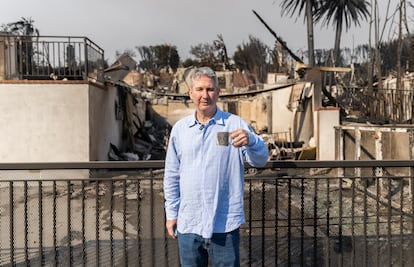
Fire is not patient. Flames do not wait; they do not hold back, they do not put up with anything or anyone getting in their way. Since last week, Los Angeles County has been facing the worst wildfires in its history, fueled by multiple blazes, particularly two: the Palisades Fire in the northwest, near the beaches of Malibu, and the Eaton Fire in the northeast. Together, they have burned 40,000 acres, destroying homes and the lives of those who once resided there. More than 80,000 people remain displaced after eight days of emergency. Some fled with only the clothes on their backs. Others had more time, perhaps a few moments, to think about what to take from their homes, to choose that object whose loss might leave them with lingering regret.
Each story is unique. Some evacuated as a precaution, only to return to nothing but ash and rubble. Neighbors and acquaintances recount these tragedies, as authorities have barred victims from re-entering their neighborhoods. Others were away from home when disaster struck. And some found themselves surrounded by flames and had to flee at once.
Evacuation checklists recommend, if you have at least two hours, gathering family photos, artwork, a suitcase of clothes, journals, and camping gear. Essentials might include a cooler with food and drinks, protective equipment, important documents like property deeds, licenses, insurance policies, and banking information, as well as powers of attorney. And the most basic of all: wallet, keys, glasses, phone charger, bank cards, medications, pets, flashlights, extra batteries, and a mask. What would you save from the fire?
A mug from New Zealand
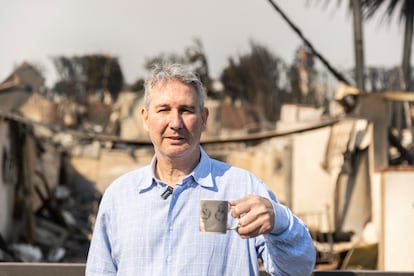
Steven Kolker wonders if death is similar to what happened to his house. “One day you’re there, the next, you’re gone,” muses the 56-year-old pathologist, who is walking with his wife through the ruins on Marquez Terrace Street. He is well-dressed for the occasion, wearing the same shirt and jeans he had on when he fled his Pacific Palisades home on Tuesday, January 7. He took nothing else from what the rubble reveals was once an elegant three-story residence. As he surveys the destruction wrought by the fire in his neighborhood, he wonders what more he might have saved. Perhaps his golf clubs. Or the microscope from his study, a space where he loved to spend time. “In the end, it’s all material things that don’t matter,” he reflects.
Inside the dishwasher, however, Kolker found a mug he bought on a trip to New Zealand last October. It is a small ceramic mug, used for drinking espresso. It is decorated with kiwis, the traditional New Zealand bird. He holds it in his hands as if it were a treasure. “I am not much of a souvenir person, but now it is a souvenir that will make me think of something forever,” admits Kolker. The doctor lived in the house with his second wife. Today he tries to remain optimistic amid the ashes. “It is like walking in Pompeii,” he jokes. “It was too big a house for the two of us. I had already thought about renovating it, and this has forced me to finally get down to work.”
The Eckhoffs' chameleon
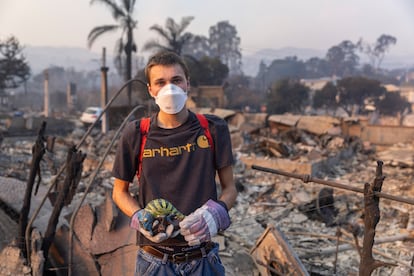
Steve Eckhoff has called Pacific Palisades home for decades. For the past 12 years, he has lived in a house on Las Lomas Drive, an elevated area with views of both the ocean and the mountains. Photos on Google Maps show a small, blue, one-story home with a chimney on a street that looks like something out of an episode of Desperate Housewives, with perfectly trimmed hedges and whitewashed doors. Now it is all gray, burned to ashes, with only a few smoldering chimneys still standing. Steve manages to reach the home on Thursday afternoon, a couple of days after it was razed by the Palisades Fire. Together with his 20-year-old son, Caden, they search through the still-warm remains for mementos. They are looking, above all, for the figures they had in the backyard, the few that survive: a brass sun, a peace symbol hanging on the wall but too hot and heavy to retrieve, and most importantly, a chameleon.
Fighting back tears, Caden Eckhoff explains that it belongs to his mother, who did not want to return with them to the house. They are not too far away, but it took more than four hours to get in because of the checkpoints and the closed areas. “I left with what I was wearing. I left my car here,” he says, looking at his clothes from head to toe. “There are many fires every year, we have been evacuated about five times, but of course, at nightfall we were back home,” he explains, emotionally, while trying to recover whatever he could, a broken cup, a door handle.
Veronica Vackova’s cassettes
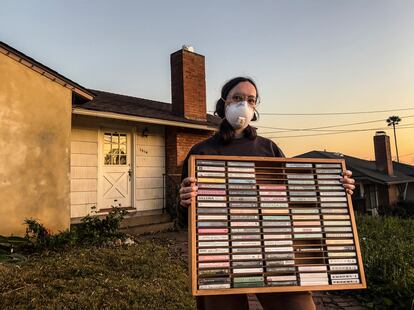
It was only eight months ago that Veronica Vackova, 36, and Chad Robertson, 41, bought their house at the top of Altadena, very close to the Angeles National Forest. Veronica, a Czech film editor who has been in the country for years (her partner is a school teacher), says that it cost them $1,065,000, which they paid thanks to a very high and difficult-to-get mortgage. They left on Tuesday night as a precaution, because some friends encouraged them to go and spend the night with them. They were not able to return until late Saturday afternoon. The couple were lucky: the house was still standing, although they had lost the back garage. “This is the most surreal thing I have ever experienced in my entire life,” says Veronica.
They hadn’t taken much with them. “We don’t have many valuable things. We’re young and we just bought the house with all the money we had, it was a very, very big risk because the mortgage was very high. Now I don’t know what will happen,” she explains, “but we’re taking photographs and things like that — diplomas, certificates, documents.” With the car full of “nostalgic” items, she says there was something they didn’t want to leave behind, despite their size: Chad’s cassettes. They couldn’t leave without them.
Coco, the goat influencer
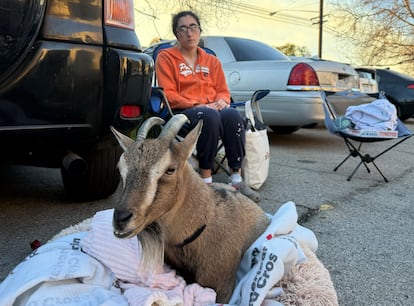
Much has been made of the human tragedy left in the wake of the Los Angeles fires. But the flames have also claimed the lives of tens of thousands of pets across the affected regions. The Palisades Fire tore through an area teeming with animal life. At Will Rogers Park, the stables were consumed by fire, but all 17 horses housed there were evacuated and are safe and sound, although they needed nebulizers to keep from dying of smoke inhalation. A viral video shows a man escorting donkeys and horses away from his ranch, which ultimately succumbed to the flames. Meanwhile, the Pasadena Humane Society has taken in around 400 animals from the Altadena area, devastated by the Eaton Fire.
Coco has not recovered from the disaster. The nearly 10-year-old pygmy goat has all the symptoms of post-traumatic stress, says her owner and caretaker, Rezvon Amirani. Coco refuses to drink any of the juices the family prepares for her in a blender salvaged from their burned-out house in Malibu. The animal is constantly on edge. She is now staying at a shelter run by the Red Cross, which takes in small and medium-sized pets affected by the fires. The Amirani family, originally from Iran, spends most of their time outside the shelter because the goat is terrified of dogs. Rezvon, a 24-year-old artist, manages Coco’s Instagram account, which has become a star in the aftermath of the disaster and now has more than 3,000 followers. In addition to her pet, Rezvon also took with her a curious bat-shaped urn she found in a second-hand store.
Leaving with the bare necessities
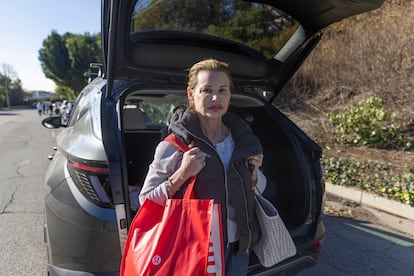
Marni Galef has been waiting patiently for over an hour in her luxurious cream-colored SUV to access the ashes of her home in Pacific Palisades. She chats with neighbors — both those she knows and those she doesn’t — who are also lined up at checkpoints on Sunset Boulevard, hoping to be allowed back into their homes. Officially, entry is only permitted to retrieve medicine or pets, but Marni doesn’t care: she’s going to try to get through in any way she can. This real estate agent has lived in Pacific Palisades all her life, as her parents, now in their eighties, have done, and her children, now in their twenties, do, and she can’t believe what’s happened.
What did she take when she fled her home, as the winds began to threaten it? “Almost nothing,” she admits, “my dog, my cat, my parents.” She didn’t think about valuables or sentimental items. She takes out a couple of bags from mid-to-high-end brands, along with a plastic bag from a well-known sportswear company, where she packed a couple of changes of clothes. Nothing more. “A couple of changes of clothes, some documents, and my laptop. We don’t have offices, they have burned down. I’m glad to have it, so I can do something.” Without an office, without a home, the laptop and a couple of bags are the only things she has left.
Sign up for our weekly newsletter to get more English-language news coverage from EL PAÍS USA Edition
Tu suscripción se está usando en otro dispositivo
¿Quieres añadir otro usuario a tu suscripción?
Si continúas leyendo en este dispositivo, no se podrá leer en el otro.
FlechaTu suscripción se está usando en otro dispositivo y solo puedes acceder a EL PAÍS desde un dispositivo a la vez.
Si quieres compartir tu cuenta, cambia tu suscripción a la modalidad Premium, así podrás añadir otro usuario. Cada uno accederá con su propia cuenta de email, lo que os permitirá personalizar vuestra experiencia en EL PAÍS.
¿Tienes una suscripción de empresa? Accede aquí para contratar más cuentas.
En el caso de no saber quién está usando tu cuenta, te recomendamos cambiar tu contraseña aquí.
Si decides continuar compartiendo tu cuenta, este mensaje se mostrará en tu dispositivo y en el de la otra persona que está usando tu cuenta de forma indefinida, afectando a tu experiencia de lectura. Puedes consultar aquí los términos y condiciones de la suscripción digital.








































